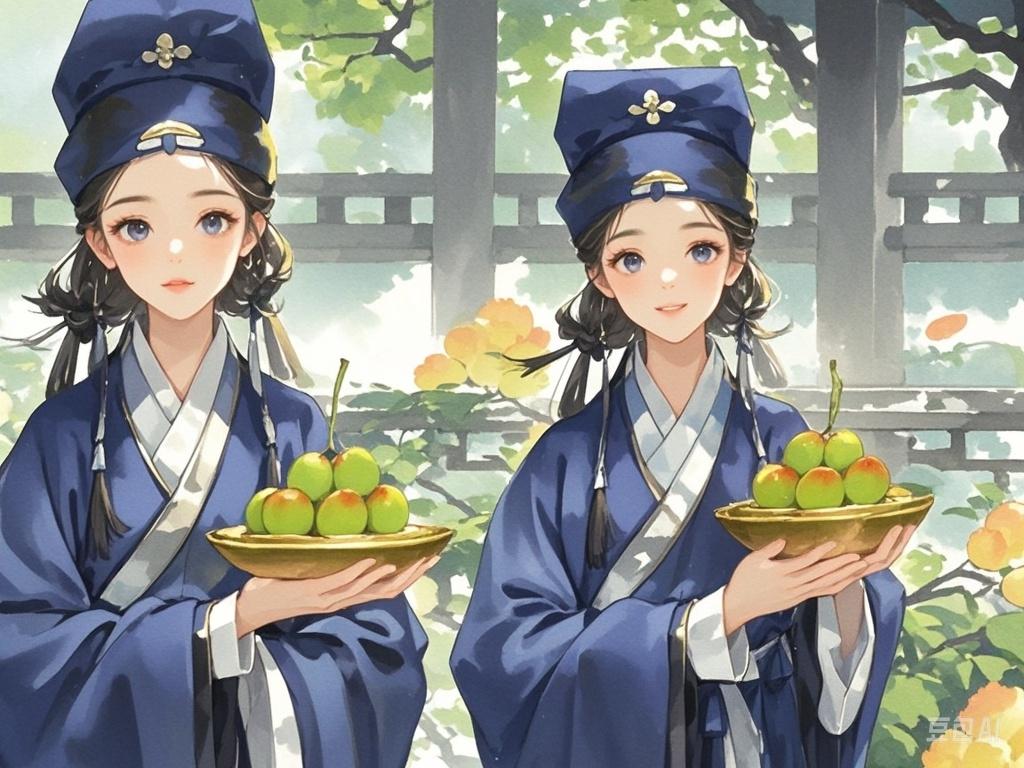In a picturesque village nestled among the rolling hills of southern China, there lived a humble woodcarver named Li Qing. Li Qing came from a long line of artisans, each one skilled in the intricate art of carving fine woods. His family had passed down the craft for generations, and their specialty was a rare and precious wood—Golden Silk Nanmu. This type of wood was renowned not only for its rich color and subtle fragrance but also for its natural properties of longevity and resilience, making it highly prized by artisans and collectors alike.
Li Qing had inherited his grandfather's talent for carving, but more importantly, he had inherited his deep respect for the traditions and teachings of Daoism, which emphasized harmony with nature and the balance of energies. His carving tools, made of bamboo and jade, were blessed by local Daoist priests to ensure that the carvings would resonate with the natural world and bring peace to those who owned them.
One day, after weeks of contemplation, Li Qing decided to carve a pair of Pixiu—a mythical beast often associated with wealth and prosperity. According to Daoist beliefs, Pixiu, with its fierce lion-like appearance and a body that symbolized strength and protection, was known to have the power to attract wealth and ward off evil spirits. It was said that Pixiu would devour treasures but would not allow any of its bounty to escape. This made the beast a popular symbol in the world of commerce and business, where it was often used as a talisman to ensure financial success.
Li Qing, guided by the Daoist teachings of balance and harmony, chose a beautiful block of Golden Silk Nanmu wood. The grain of the wood was rich and intricate, almost like the flow of the Dao itself, and the natural fragrance of the wood seemed to calm the mind. As Li Qing carefully carved the Pixiu, he did not rush the work. Each stroke of the knife was deliberate, as if he were drawing from the deep well of wisdom that Daoism encouraged—observing the flow of nature and allowing the energy of the wood to guide his hands.
For hours, Li Qing worked in his quiet workshop, the only sounds being the rhythmic scrape of his tools and the soft whisper of the wind outside. As the Pixiu took shape, he could feel a quiet energy building within the room. The creatures were coming to life in the wood, their bodies contorting and stretching as if they were eager to spring into action, to fulfill their ancient purpose of guarding wealth and fortune.
Finally, after several days of labor, Li Qing completed the pair of Pixiu. The carvings were exquisite—each detail finely etched, from the flowing mane of the beast to its muscular legs and the open mouth ready to devour riches. He decided to turn these carvings into a bracelet, a beautiful piece of craftsmanship that could be worn by someone who needed the protection and prosperity the Pixiu promised. With the bracelet completed, he made his way to the nearby Daoist temple, where the priest had blessed his work in the past.
It was there that Li Qing’s creation was unexpectedly noticed by a wealthy merchant named Zhang Wei. Zhang Wei had heard of Li Qing's work through local gossip but had never seen it for himself. When he spotted the Pixiu bracelet, he was immediately struck by the fine craftsmanship and the mysterious energy it seemed to emanate. He couldn’t help but admire the smooth curves and intricate details of the carvings, but what caught his attention most was the subtle fragrance of Golden Silk Nanmu, which seemed to invoke a sense of peace and focus in his heart.
"This is exquisite," Zhang Wei said as he approached Li Qing, his eyes wide with admiration. "I have seen many fine works of art, but there is something truly special about this. How much do you ask for this bracelet?"
Li Qing, though humble, had grown accustomed to the value of his work, but he also believed that true art should be shared with those who could appreciate it and benefit from its meaning. Without hesitation, he gave Zhang Wei a price that seemed fair for the craftsmanship but also symbolized the spirit of giving and receiving in balance. Zhang Wei, eager to possess such a meaningful piece, did not hesitate to pay.
"I shall wear this with great care," Zhang Wei said, as he placed the bracelet around his wrist. He could feel a surge of energy, almost as if the bracelet was working to align his intentions with the natural flow of wealth and success. He immediately felt a sense of peace, something he had not felt in years, despite his growing wealth.
As the days passed, Zhang Wei’s life began to change. His business, which had been stagnating for months, suddenly took off. Contracts began to flow in from new clients, and his wealth grew at an astonishing rate. People noticed his success, and he attributed it to the Pixiu bracelet, which he now wore at all times. He believed that the Pixiu, with its ability to attract wealth and protect its owner, had indeed worked its magic.
But Zhang Wei did not keep the bracelet to himself. As his family grew and his business flourished, he passed the bracelet down to his son, telling him of the power it held and the importance of respecting the balance of wealth and virtue. “Wealth,” Zhang Wei would tell his son, “is not something to hoard or squander. It must be treated with respect, and only when one’s heart is balanced can the true flow of abundance be realized.”
The Pixiu bracelet was passed down from generation to generation, each heir continuing to prosper, yet always mindful of the Daoist teachings that accompanied the bracelet. Zhang Wei’s grandson, a man of great success in his own right, would often reflect on the lessons passed down with the bracelet. He would say to his children, "This bracelet is not just an object of wealth. It is a reminder that true prosperity comes when we align ourselves with the Dao—the natural way of things. Our wealth is not for ourselves alone, but for the good of the community and the world around us."
The Pixiu bracelet became a cherished family heirloom, a symbol not only of material success but also of spiritual wisdom. Its power lay not only in the carved wood but in the teachings it carried. The Golden Silk Nanmu, revered for its strength and longevity, was a perfect representation of the enduring connection between material wealth and spiritual harmony.
As the years went by, Li Qing’s legacy grew. His simple act of carving a pair of Pixiu had not only brought prosperity to a merchant, but it had spread far beyond his village, impacting countless lives. The Daoist wisdom he had infused into each carving was passed down, ensuring that the Pixiu bracelet continued to bring not only wealth but also balance, protection, and peace to all who possessed it.
Daoist Wisdom in the Tale of the Pixiu Bracelet
At its core, this story is an illustration of Daoist philosophy—a philosophy that teaches the importance of balance, harmony, and non-interference with the natural flow of the world. The Pixiu, with its ability to attract wealth, serves as a symbol of the Daoist belief in the abundance of the universe. According to Daoism, wealth is a natural force that should not be hoarded or sought after greedily. Instead, it is a byproduct of living in harmony with the world, of maintaining balance between one's inner state and the external world.
The Golden Silk Nanmu wood, chosen by Li Qing, is symbolic of longevity, strength, and purity. Daoism teaches that the physical world is not separate from the spiritual realm. Every material object, when crafted with care and respect for the natural forces, can carry spiritual significance. Li Qing’s carving is a perfect example of this—his creation of the Pixiu, rooted in the Daoist belief of wealth and protection, becomes more than just an object; it is a conduit for spiritual energy.
Zhang Wei’s experience with the bracelet further emphasizes the Daoist principle that true wealth comes when one’s heart is in harmony with the Dao. His success is not merely a product of external effort but of internal peace and alignment with the flow of the universe. The bracelet serves as a reminder that wealth, while valuable, is a temporary gift that must be treated with humility and respect.
In the end, the Pixiu bracelet becomes a symbol of the Daoist ideal—a balance between material wealth and spiritual well-being. By understanding the deeper meanings behind wealth and prosperity, Li Qing and his descendants were able to cultivate not only material success but also peace and wisdom that endured through generations. The bracelet, passed down as a family heirloom, was not only a token of wealth but a reminder of the Daoist way of living—living in harmony with the world, respecting the forces of nature, and sharing prosperity with others.



